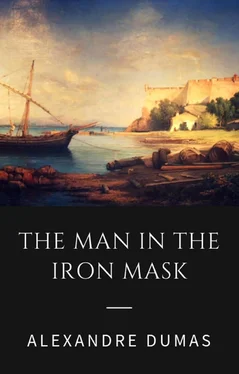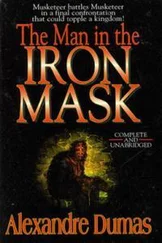Title Page
Introduction
Chapter I. The Prisoner.
Chapter II. How Mouston Had Become Fatter without Giving Porthos Notice Thereof, and of the Troubles Which Consequently Befell that Worthy Gentleman.
Chapter III. Who Messire Jean Percerin Was.
Chapter IV. The Patterns.
Chapter V. Where, Probably, Moliere Obtained His First Idea of the Bourgeois Gentilhomme.
Chapter VI. The Bee-Hive, the Bees, and the Honey.
Chapter VII. Another Supper at the Bastile.
Chapter VIII. The General of the Order.
Chapter IX. The Tempter.
Chapter X. Crown and Tiara.
Chapter XI. The Chateau de Vaux-le-Vicomte.
Chapter XII. The Wine of Melun.
Chapter XIII. Nectar and Ambrosia.
Chapter XIV. A Gascon, and a Gascon and a Half.
Chapter XV. Colbert.
Chapter XVI. Jealousy.
Chapter XVII. High Treason.
Chapter XVIII. A Night at the Bastile.
Chapter XIX. The Shadow of M. Fouquet.
Chapter XX. The Morning.
Chapter XXI. The King's Friend.
Chapter XXII. Showing How the Countersign Was Respected at the Bastile.
Chapter XXIII. The King's Gratitude.
Chapter XXIV. The False King.
Chapter XXV. In Which Porthos Thinks He Is Pursuing a Duchy.
Chapter XXVI. The Last Adieux.
Chapter XXVII. Monsieur de Beaufort.
Chapter XXVIII. Preparations for Departure.
Chapter XXIX. Planchet's Inventory.
Chapter XXX. The Inventory of M. de Beaufort.
Chapter XXXI. The Silver Dish.
Chapter XXXII. Captive and Jailers.
Chapter XXXIII. Promises.
Chapter XXXIV. Among Women.
Chapter XXXV. The Last Supper.
Chapter XXXVI. In M. Colbert's Carriage.
Chapter XXXVII. The Two Lighters.
Chapter XXXVIII. Friendly Advice.
Chapter XXXIX. How the King, Louis XIV., Played His Little Part.
Chapter XL: The White Horse and the Black.
Chapter XLI. In Which the Squirrel Falls,—the Adder Flies.
Chapter XLII. Belle-Ile-en-Mer.
Chapter XLIII. Explanations by Aramis.
Chapter XLIV. Result of the Ideas of the King, and the Ideas of D'Artagnan.
Chapter XLV. The Ancestors of Porthos.
Chapter XLVI. The Son of Biscarrat.
Chapter XLVII. The Grotto of Locmaria.
Chapter XLVIII. The Grotto.
Chapter XLIX. An Homeric Song.
Chapter L: The Death of a Titan.
Chapter LI. Porthos's Epitaph.
Chapter LII. M. de Gesvres's Round.
Chapter LIII. King Louis XIV.
Chapter LIV. M. Fouquet's Friends.
Chapter LV. Porthos's Will.
Chapter LVI. The Old Age of Athos.
Chapter LVII. Athos's Vision.
Chapter LVIII. The Angel of Death.
Chapter LIX. The Bulletin.
Chapter LX. The Last Canto of the Poem.
Epilogue.
Imprint
THE MAN IN THE IRON MASK
by Alexandre Dumas pere
The Vicomte de Bragelonne is the final volume of D'Artagnan Romances: it is usually split into three or four parts, and the final portion is entitled The Man in the Iron Mask. The Man in the Iron Mask we're familiar with today is the last volume of the four-volume edition. [Not all the editions split them in the same manner, hence some of the confusion...but wait...there's yet more reason for confusion.]
We intend to do ALL of The Vicomte de Bragelonne, split into four etexts entitled The Vicomte de Bragelonne, Ten Years Later, Louise de la Valliere, and The Man in the Iron Mask.
One thing that may be causing confusion is that the etext we have now, entitled Ten Years Later, says it's the sequel to The Three Musketeers. While this is technically true, there's another book, Twenty Years After, that comes between. The confusion is generated by the two facts that we published Ten Years Later BEFORE we published Twenty Years After, and that many people see those titles as meaning Ten and Twenty Years "After" the original story...however, this is why the different words "After" and "Later"...the Ten Years "After" is ten years after the Twenty Years later...as per history. Also, the third book of the D'Artagnan Romances, while entitled The Vicomte de Bragelonne, has the subtitle Ten Years Later. These two titles are also given to different volumes: The Vicomte de Bragelonne can refer to the whole book, or the first volume of the three or four-volume editions. Ten Years Later can, similarly, refer to the whole book, or the second volume of the four-volume edition. To add to the confusion, in the case of our etexts, it refers to the first 104 chapters of the whole book, covering material in the first and second etexts in the new series. Here is a guide to the series which may prove helpful:
The Three Musketeers: Etext 1257—First book of the D'Artagnan Romances. Covers the years 1625-1628.
Twenty Years After: Etext 1259—Second book of the D'Artagnan Romances. Covers the years 1648-1649. [Third in the order that we published, but second in time sequence!!!]
Ten Years Later: Etext 1258—First 104 chapters of the third book of the D'Artagnan Romances. Covers the years 1660-1661.
The Vicomte de Bragelonne: Etext 2609 (first in the new series)—First 75 chapters of the third book of the D'Artagnan Romances. Covers the year 1660.
Ten Years Later: Etext 2681 (second in the new series)—Chapters 76-140 of that third book of the D'Artagnan Romances. Covers the years 1660-1661. [In this particular editing of it]
Louise de la Valliere: Etext 2710 (third in the new series)—Chapters 141-208 of the third book of the D'Artagnan Romances. Covers the year 1661.
The Man in the Iron Mask: Etext 2759 (our next text)—Chapters 209-269 of the third book of the D'Artagnan Romances. Covers the years 1661-1673.
Here is a list of the other Dumas Etexts we have published so far:
Sep 1999 La Tulipe Noire, by Alexandre Dumas[Pere#6/French][tlpnrxxx.xxx]1910 This is an abridged edition in French, also see our full length English Etext Jul 1997 The Black Tulip, by Alexandre Dumas[Pere][Dumas#1][tbtlpxxx.xxx] 965 Jan 1998 The Count of Monte Cristo by Alexandre Dumas[Pere][crstoxxx.xxx]1184
Many thanks to Dr. David Coward, whose editions of the D'Artagnan Romances have proved an invaluable source of information.
In the months of March-July in 1844, in the magazine Le Siecle, the first portion of a story appeared, penned by the celebrated playwright Alexandre Dumas. It was based, he claimed, on some manuscripts he had found a year earlier in the Bibliotheque Nationale while researching a history he planned to write on Louis XIV. They chronicled the adventures of a young man named D'Artagnan who, upon entering Paris, became almost immediately embroiled in court intrigues, international politics, and ill-fated affairs between royal lovers. Over the next six years, readers would enjoy the adventures of this youth and his three famous friends, Porthos, Athos, and Aramis, as their exploits unraveled behind the scenes of some of the most momentous events in French and even English history.
Eventually these serialized adventures were published in novel form, and became the three D'Artagnan Romances known today. Here is a brief summary of the first two novels:
The Three Musketeers (serialized March—July, 1844): The year is 1625. The young D'Artagnan arrives in Paris at the tender age of 18, and almost immediately offends three musketeers, Porthos, Aramis, and Athos. Instead of dueling, the four are attacked by five of the Cardinal's guards, and the courage of the youth is made apparent during the battle. The four become fast friends, and, when asked by D'Artagnan's landlord to find his missing wife, embark upon an adventure that takes them across both France and England in order to thwart the plans of the Cardinal Richelieu. Along the way, they encounter a beautiful young spy, named simply Milady, who will stop at nothing to disgrace Queen Anne of Austria before her husband, Louis XIII, and take her revenge upon the four friends.
Читать дальше












